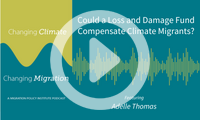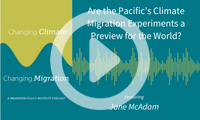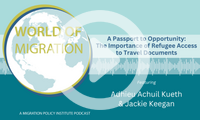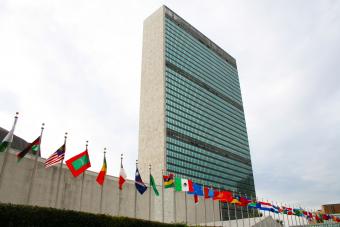International Governance
Recent Activity

In this episode of the Changing Climate, Changing Migration podcast, we speak with Adelle Thomas from Climate Analytics about efforts to provide restitution for people who have been negatively affected by the impacts of climate change, potentially including displacement.

What can the rest of the world learn from climate migration legal experiments in the Pacific? This episode of the Changing Climate, Changing Migration podcast features insights from renowned legal scholar Jane McAdam, who directs the Kaldor Centre for International Refugee Law at UNSW.

This webinar examines the challenges that refugees and other migrants face in—and place on—secondary cities, municipal capacity to respond to needs, the types of support required at national and other levels, and how development actors can better partner with secondary cities and local actors.

Travel documents play an important role in international mobility, and for refugees serve as an essential gateway to a world of opportunities, from pursuing education and employment to reuniting with family. This episode unpacks the complexities around travel documents and their pivotal role in refugees' livelihoods.

With the Global Refugee Forum approaching, this webcast explores how municipalities and other key stakeholders can be engaged in informing and delivering on the 2024 resettlement and complementary pathways pledges.
Pages
Recent Activity
The COVID-19 pandemic’s impacts on mobility in the Middle East and North Africa were immediate and wide-reaching. These include the world’s largest and most sustained repatriation efforts for stranded migrants, halted and reversed irregular journeys, and a reckoning with some countries’ reliance on foreign labor. This report examines how these impacts varied across countries in this highly diverse region, as well as the uneven recovery.
The COVID-19 pandemic hit South American nations at a time when many were already contending with major migration challenges. Historic levels of intraregional migration and displacement, notably from Venezuela, collided with countries’ attempts to stop the spread of a new threat to public health. This report examines the region’s responses to the public-health crisis, and the immediate and lasting impacts on cross-border movement.
The story of the COVID-19 pandemic in Europe is chiefly one of challenges to solidarity and coordination. Cross-border movement—even within Europe’s Schengen Area—ground to a halt, and countries took varied approaches to using travel measures in an attempt to slow the virus’s spread. This report explores the pandemic’s impacts on mobility to and within Europe, its challenges to European solidarity, and lessons for future public-health crises.























As Europe and the United States Face Similar Migration Challenges, Spain Can Act as a Bridge